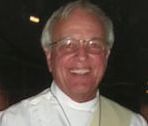“Peter, standing with the eleven raised his voice and addressed them...This Jesus God raised up, and of that all of us are witnesses. So those who welcomed his message were baptized and that day about three thousand persons were added. They devoted themselves to the apostles’ teaching and fellowship, to the breaking of bread and the prayers.” Acts 1: 14, 41-42
I believe it is always a good idea and a rewarding meditation to remind ourselves what is really going on in the liturgy of the Holy Eucharist and to reflect on its importance in our lives beyond the place where this all takes place.
The six-page pamphlet, “The Four Movements of the Eucharist” by the Rev. Samuel Lloyd III from Boston’s Trinity Church from Forward Movement Publications, summarizes what those early baptized followers of The Way began and continues to this day.
A mediation and study of these four movements always reminds me that God gifts us so much in the richness of the liturgy. The word “Eucharist” originally comes from the Greek for thanksgiving. The word “liturgy” is from Latin and Greek meaning the ministering or the work of the people.
When we enter the nave and face the altar, we open ourselves to what’s going to happen with quiet and prayer. In my reflection, I see the altar, lit with candles. I see the opening procession, the Gospel book raised in honor and expectation.
We hear and respond to the “Blessed be God.” We hear the opening Collect, a prayer recited by the celebrant but to me our own prayer to Almighty God to remind us who we are, why we’re here. We sing the “Gloria” proclaiming that God is at work in our lives forgiving us, sanctifying us, healing us.
In the Liturgy of the Word, scripture and sermon lift our sight beyond our own concerns; help us to see with God’s eyes the real world about us; call us to be part of Christ’s healing work.
Now we respond to all that went before. We offer our cares and concerns in The Prayers of the People. We then confess to God our failures and brokenness. And, thanks be to God, undeserving as we are, we are healed and forgiven!.
Christ always uses the common, the ordinary to teach us, to heal us and to nourish us. With the celebrant, together we offer up the bread and wine to be blessed. We ask the Holy Spirit to sanctified us. And Christ feeds us with the spiritual food of his Body and Blood. Leaving the altar, we are somehow changed, something is confirmed deep within us.
We then together we raise a prayer of thanksgiving that nourished by Christ we are truly living members of Christ Jesus. Thanks be to God. Worshipping in community, being nourished by Christ in the Holy Eucharist.
Finally, God sends us out to do our given work, to love and to serve in the Name of Jesus Christ.
I believe it is always a good idea and a rewarding meditation to remind ourselves what is really going on in the liturgy of the Holy Eucharist and to reflect on its importance in our lives beyond the place where this all takes place.
The six-page pamphlet, “The Four Movements of the Eucharist” by the Rev. Samuel Lloyd III from Boston’s Trinity Church from Forward Movement Publications, summarizes what those early baptized followers of The Way began and continues to this day.
A mediation and study of these four movements always reminds me that God gifts us so much in the richness of the liturgy. The word “Eucharist” originally comes from the Greek for thanksgiving. The word “liturgy” is from Latin and Greek meaning the ministering or the work of the people.
When we enter the nave and face the altar, we open ourselves to what’s going to happen with quiet and prayer. In my reflection, I see the altar, lit with candles. I see the opening procession, the Gospel book raised in honor and expectation.
We hear and respond to the “Blessed be God.” We hear the opening Collect, a prayer recited by the celebrant but to me our own prayer to Almighty God to remind us who we are, why we’re here. We sing the “Gloria” proclaiming that God is at work in our lives forgiving us, sanctifying us, healing us.
In the Liturgy of the Word, scripture and sermon lift our sight beyond our own concerns; help us to see with God’s eyes the real world about us; call us to be part of Christ’s healing work.
Now we respond to all that went before. We offer our cares and concerns in The Prayers of the People. We then confess to God our failures and brokenness. And, thanks be to God, undeserving as we are, we are healed and forgiven!.
Christ always uses the common, the ordinary to teach us, to heal us and to nourish us. With the celebrant, together we offer up the bread and wine to be blessed. We ask the Holy Spirit to sanctified us. And Christ feeds us with the spiritual food of his Body and Blood. Leaving the altar, we are somehow changed, something is confirmed deep within us.
We then together we raise a prayer of thanksgiving that nourished by Christ we are truly living members of Christ Jesus. Thanks be to God. Worshipping in community, being nourished by Christ in the Holy Eucharist.
Finally, God sends us out to do our given work, to love and to serve in the Name of Jesus Christ.


 RSS Feed
RSS Feed